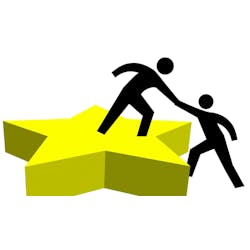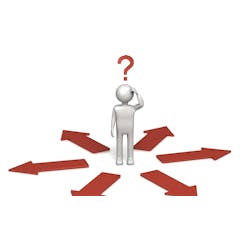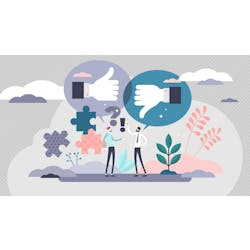BY Dorothy Garlough, RDH, MPA
Sarah realizes that she is in a lab-a human lab. Managing people is the most challenging and also the most rewarding aspect of her new job as the office manager. For years, the staff has been functioning like a plugged saliva ejector-that is, they have been functioning so ineffectively that everyone is slowly choking on disengagement. For months, Sarah has been applying the "discovery cycle" to the problems she has seen in her multigenerational office, and now, it's time to experiment. What processes and programs can be put in place that might bring the team together? How can the generational divide be mended? What can be done to help address the malaise in the office? As with all experiments, there is a risk of failure, and Sarah realizes that how she responds to any potential failures will be key to future successes.
The approach Sarah takes to experimenting is important in order for the team's ability to reframe the way they think about processes and risks. She knows that the antidote to fear is trust and that the best way to build trust is to respond well to failure. If failure should occur, there can be no finger pointing, and old assumptions will need to be analyzed. Experimenting, after all, is a fact-finding mission, and any outcome is good because it yields new information. If there is failure, the team will have learned what hasn't worked and will be able to readjust for other experiments.
The goal is to build a healthy team environment by cultivating deep connections and creating a space to share fears and challenges. A successful team will creatively wrestle with real problems-whether external (a volatile confrontation) or internal (an overly active inner critic)-and thus develop a solid sense of trust. Of course, any new idea can be ugly at first and is often met with resistance. However, it is also full of potential. It is this unchartered potential that excites Sarah.
Sarah would like to establish a mentorship program within the office. She realizes that not everyone will be a good match for a mentor/mentee relationship, yet she believes this strategy could work well for some staff members. She personally has had the benefit of this rich developmental relationship for years. Under the tutelage of her mentor, Sarah has grown and expanded her skills. Her capable mentor has been an asset during this transformational time, offering her guidance and expertise that has proven solid.
The first order of business is educating the staff on what mentorship means. In a staff meeting, Sarah articulates guidelines for navigating the mentor/mentee relationship. She tells the team that a mentor walks a path you want to follow, setting an example you can imitate. A mentor will teach and share experiences, answering your difficult questions and asking even more difficult ones. Sarah expresses that a mentor will push you and demand more of you than you demand of yourself, yet at the same time, the mentor believes in you. The right mentor is willing to help you achieve your goals, providing you with unique opportunities to prove yourself.
Steps for mastering protégé skills
1. Select people you admire and trust. Ask: What have they done, said or accomplished to warrant your admiration and trust? What feedback about them can you gain from other trusted professionals? Do they have time? Are they willing to mentor you
2. Define what you want from a mentoring relationship. Ask: What do I want to receive from this relationship? What goals do I have in mind? How frequently should we meet? How will we define the purpose of each meeting? How will we measure the success of our relationship? How will we know we've reached the limit of the effectiveness of our relationship
3. Be open to the mentor's ongoing feedback to grow in knowledge and wisdom. A mentor wants you to act on their advice and direction. Ask: Am I willing to learn?1
Most successful professionals will declare that having a mentor helped them to succeed. The mentee gains from her mentor's knowledge and experience, and the mentor gains by passing on her expertise to uplift not just the mentee, but also the entire organization. A successful mentor/mentee relationship will see the mentor valuing the mentee's opinions and ideas by seeking input, and in turn, the mentee learns. A mutual liking, caring, and even loving connection is created, that is rich and fulfilling for both parties.
As Sarah reveals the benefits of having her own mentor, the team members are intrigued, interested, and inspired. In a refreshing twist, the traditionalist front desk administrator, who has been struggling with technology, asks the reserved generation-X dental assistant if she would consider mentoring her. The assistant is thrilled to be recognized publicly for her advanced expertise and accepts the role. Although these two women have worked together for two years and have a mutual respect for each other, the 31-year age difference has been a barrier. With a common goal in mind, they recognize that age is irrelevant, and both women are sparked by the possibility of learning and sharing.
Another mentor relationship has recently been birthed. The millennial hygienist recounts the story to the team. A sixteen-year-old patient presented herself two weeks after her new-patient diagnosis for her periodontal appointment. The millennial hygienist became concerned because of a silver-dollar-sized wound with radiating inflammation on the teenager's chin. This had not been noted at the initial appointment, and clearly the teenager was evasive, not wanting to talk about it. This triggered a larger question for the millennial hygienist: Was this child abuse, or was it a bizarre condition, such as a flesh-eating disease?
Not knowing what to do, she went to Sarah, who saw this as an opportunity to experiment and plant the seed for a mentoring relationship between two hygienists: the millennial hygienist and the baby-boomer hygienist, who volunteers at a women's shelter and has years of experience in recognizing oral/facial conditions. Sarah suggested that the young hygienist approach the more experienced team member for her input and possible mentoring.
Within the privacy of the operatory, the baby boomer hygienist expertly addresses the open wound while making the teenager feel safe and cared for. As the millennial hygienist observes her older coworker's communication style, a new respect is born. She is amazed at how the teenager's fears evaporate with the older hygienist's sensitive and poignant questions. The younger hygienist recognizes that the older hygienist has much to offer and decides to ask her coworker if she will mentor her. The entire staff is relieved (and humored) to learn that the open sore was a whisker burn, a condition that resulted from the girl making out with her boyfriend!
Only time will tell if this experiment in mentorship is helpful, but the team is open to trial-and-error. In fact, they are offering ideas that can help to evaporate the negative energy that has been present for years. It is decided that at next month's half-day staff meeting, these ideas will be discussed and developed. Sarah is pleased because she knows that the generation barrier will fall when there is buy-in from everyone. She looks forward to next month's meeting to test what can be created synergistically. RDH
References
1. Martin A, Tulgan B. Managing the Generation Mix. HRD Press Inc. 2006
Dorothy Garlough, RDH, MPA, is an innovation architect, facilitating strategy sessions and forums to orchestrate change in both the dental and corporate worlds. As an international speaker and writer, Dorothy trains others to broaden their skill-set to include creativity, collaborative innovation and forward thinking. She recognizes that engagement is the outcome when the mechanisms are put in place to drive new innovations. Connect with her at [email protected] .





